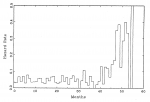Citation:
James E Alt and Gary King. 1994. “Transfers of Governmental Power: The Meaning of Time Dependence.” Comparative Political Studies, 27, Pp. 190–210. Copy at https://tinyurl.com/y23z2x9v
| Article | 1.92 MB |

Abstract:
King, Alt, Burns, and Laver (1990) proposed and estimated a unified model in which cabinet durations depended on seven explanatory variables reflecting features of the cabinets and the bargaining environments in which they formed, along with a stochastic component in which the risk of a cabinet falling was treated as a constant across its tenure. Two recent research reports take issue with one aspect of this model. Warwick and Easton replicate the earlier findings for explanatory variables but claim that the stochastic risk should be seen as rising, and at a rate which varies, across the life of the cabinet. Bienen and van de Walle, using data on the duration of leaders, allege that random risk is falling. We continue in our goal of unifying this literature by providing further estimates with both cabinet and leader duration data that confirm the original explanatory variables’ effects, showing that leaders’ durations are affected by many of the same factors that affect the durability of the cabinets they lead, demonstrating that cabinets have stochastic risk of ending that is indeed constant across the theoretically most interesting range of durations, and suggesting that stochastic risk for leaders in countries with cabinet government is, if not constant, more likely to rise than fall.See also: Event Counts and Durations